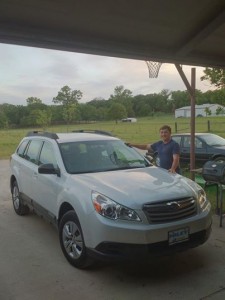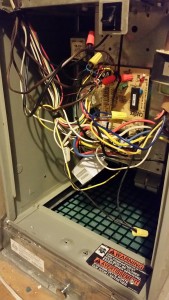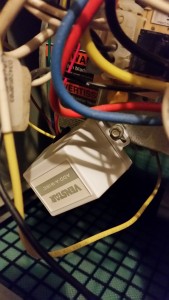self-advocacy
Overheard on the Wolfe House #310
Peggy (seeing the clock read 9 a.m.): Well, good morning! How’s the change to afternoon shift?
Sam: Good. I’m getting all my sleep back.
Be the Bumper Guard
After my family moved from the Midwest to Colorado, we started a new Christmas tradition. My grandmother, who lived in Rockford, would send a little cash instead of gifts for Christmas. She forbid my parents to use the money to pay bills. It was to have fun, she said.
So, Christmas Day, we’d all go bowling. As we grandkids had kids of our own, we kept on bowling for Christmas. Some years we’d take up as many lanes as a league would.
Those first few years, it was hard to watch the little ones learn to bowl. They would hit pins, but they would also throw a lot of gutter balls. The year the bowling alley offered lanes with bumper guards was its own kind of Christmas. The bumpers didn’t eliminate the gutter balls, but the set-up helped the kids figure out what they were supposed to do. It was nice to sit back and let them have at it. They were set up for success: they got a lot more pins and they learned more quickly how to throw. By the second or third year, my nephew was ready to ditch the bumpers and bowl in a lane with the grown-ups. He bowled great games.
My kids are grown and I’ve stopped parenting, but when Sam needs support now, I try to remember to be a bumper guard, just like I did when the kids were little.
We parents need to stand on the periphery of their lives, far enough back that the kids know they are doing things on their own, but that you’re watching, too. They need that internal message that they shouldn’t worry about hitting a lot of pins, and that they are still going to throw gutters, and sometimes the ball is going to ricochet its way down the lane, but just keep throwing and try to get strong so you can throw it straighter each time. And one day you’ll be ready to go without the bumpers. You will hit some spares and strikes and you’ll throw some gutters. And it will all be ok.
I don’t always remember to be a bumper guard. A few weeks ago, I thought someone had drained Sam’s bank account. Fear turned me into a helicopter parent. Of course, my actions, ostensibly to defend his hard-earned money, upset him. And they created other problems that he needed to solve. When I remembered my role and stepped back, he cleaned up the whole mess himself.
Our culture is changing rapidly. To survive and to thrive, all of our children, not just the ones with autism, need to be resilient. We should not stand over them and help them throw all the balls. That’s not how to make a resilient kid. With each situation, each problem, each opportunity for growth, we need figure out where to install the bumper guards, stand back and let them throw.
Butterflies
Sam was spared the agony a lot of us get in the home stretch for a new job: the long wait between a successful interview and the offer. On Friday, one rolled right after the other for him. He had the best smile when he announced over dinner that WinCo hired him to work in the warehouse.
Sam sacked groceries at Albertsons for ten years. He didn’t want to become a checker. Sometimes customers are impatient. “I wouldn’t be fast enough for them,” he said. He didn’t want to stock shelves, either. I shopped late enough on the occasional Friday night to see those guys at work. Sam couldn’t be that raucous.
Nothing came his way after he graduated with an associate’s degree and certificate in computer science and technology five years ago. It was frustrating. Once I asked a manager at Albertsons if there was a way for a loyal employee with an education to move up. She shook her head no. There aren’t corporate offices here, she said.
Then Sam got a call. WinCo was opening a warehouse in Denton. They wanted to try to hire people like Sam. He would have to quit his job at Albertsons; participate in a special, six-week training class; and interview for the job at the end. There was no guarantee he’d have the job when he finished the training. In addition, he would only be paid when he was handling actual store product in the warehouse. Otherwise the rest of the training time would be unpaid. This was a Goodwill Industries program. The training included a lot of class time on “soft skills,” like getting along with co-workers, deciding when (and when not) to disclose your disability, interviewing techniques, and the like.
Sam had been in the work force for a decade. He’d been there and done that. It didn’t seem fair for him to quit a job and go without pay for four weeks. But I know I can be skeptical. It’s an occupational hazard. I kept my mouth shut. He had a chance at a job that would quadruple his take-home pay.
(Some nights he’d come home, relay what they learned that day and I’d muse over how it might be nice for the newsroom to get a “soft skills” refresher from time to time. We often seem barely house-trained–myself included.)
This week was all butterflies. I missed the open house Sunday, but Michael and Paige went with him to see for themselves what he was shooting for. We were prepared to help Sam update his resume. No need, he said, the program folks already got his resume all wrapped up. Did he want to do some mock interviewing? Nope, he said, he’d already practiced and had notecards with sample questions and answers. He’d just look them over each night, thanks.
He was visibly nervous Thursday night. A lot had lead up to that day. He made sure he had all his interview clothes ready to go and packed up work clothes, too. After the interview, he expected to be back out on the floor, in his bay, and he needed to wear a sturdy shirt, jeans and his work boots. I kept checking my phone all day for news, but that’s not his style. He was epically impulsive as a child, but now, he almost delights in waiting to deliver good news.
I don’t know who was smiling bigger on Friday night when he told me. If it were Michael or Paige, there would be lots of hugs and backslapping and arm-squeezing. But that, too, isn’t Sam’s style. I told him I’d like to shake his hand to tell him congratulations and how proud I was of him.
He kept eye contact as he extended his hand and gripped mine. Not too hard, not too soft. Up and down, not too fast and not too slow.
I kid you not, dear Internet people.
It was the first time in my life I’ve ever experienced the perfect handshake.
Smart thermostats anywhere
By Sam Wolfe, Guest Blogger
According to the recently published news story, “Smart thermostats remember for you,” a thermostat that is “just about as smart but doesn’t connect to the Internet” was installed in the back side of this home. (We live in northwestern Denton.)
Only one wire was available to power the thermostat. According to HVAC technician Bill Clark, the thermostat pictured in this story needs two wires to operate, a hot wire and a common wire, as do all other smart thermostats you can buy.
Research shows that the common wire is not available in some applications with a non-heat pump system. This requires battery power to a digital thermostat. Only a conventional thermostat or a programmable thermostat (one that is “just about as smart but doesn’t connect to the Internet”) could be used in these applications … until now.
With a Venstar Add-a-Wire accessory box and diode, you can simply “turn one wire into two.” For more information about this accessory, follow this link:
Note from Peggy: Sam was terribly disappointed after we were able to install an internet-ready thermostat in my house, but not his apartment. (For want of that wire. I wasn’t going to pay to lay more wire in the attic.) He went in search of a solution to that problem and found the add-a-wire device. After I asked him to make sure it was UL-listed, he ordered it, and then installed both the add-a-wire and the internet-ready thermostat in his apartment (which is in the back of the house) himself. He took the photos of his handiwork so you can see what he did.
Overheard in the Wolfe House #297
Sam (after playing “good cop”): Mom, you were really pushy this morning.
Peggy (after playing “bad cop”): Yes, I was.
Sam (face in hands): I’m not sure it was the right thing.
Overheard in the Wolfe House #296
Peggy: How was work? Long day?
Sam: I’m taking a nap. If I had a ‘do not disturb’ sign, I would hang it on my door right now.
Outward Bound, the indoor edition
“Because you know, nothing bad ever happens to a writer; everything is material.” – Garrison Keillor quoting Philip Roth.
I learned about stage fright at age 10. I had been taking piano lessons for a year. My memories of that first spring recital are a little foggy, except, just before I sat down to play, I saw my dad slip in the door of the recital hall (someone wheeled a spinet piano into the school cafeteria). And I played my song without stopping.
That’s a victory when you are 10 years old.
After the recital was over, I went home with my dad. I tried to eat dinner, but instead I vomited and went to bed.
I loved playing the piano, though, so I kept up with my lessons. I didn’t play again in public for about five years. When it was time, my new piano teacher was clever. (I didn’t tell Mr. Kaehr about my stage fright. But he apparently knew and he knew how to prepare me.) He had me work up Ernesto Lecuona’s Malaguena – so fun and flashy – to play during the honor society banquet. When I was done, the crowd’s reaction told me that they didn’t expect what they’d just heard. That was incredibly affirming, enough for me to perform, and recover from performing, vomit-free, for several years.
When I headed to college, I majored in music. I could get through the performance of a single solo on a departmental recital all right, but putting together an entire solo recital was another matter. I could channel that adrenaline for 10 minutes, but not an hour or more. After one recital I couldn’t even make it through the reception afterward. Went home, vomited and slept all weekend.
I’ve never thought of myself as a risk-taker, especially compared to my late husband. To Mark’s credit, however, he thought through things. In his mind, he wasn’t taking risks. He was fearless in persevering and adapting. I tried not to be afraid of opportunities, or leaning in when problems showed up.
For example, we recognized we couldn’t get help for Sam if we were shrinking violets. We spoke up, we stood fast, we made plain that we expected delivery of the help he needed. Neither of us would take credit for what Sam has accomplished. However, we would have admitted to sweet-talking, cajoling, persuading, wheedling, and outright pushing the people around him when and where necessary. (And, I’m sure, where others in his life might have said wasn’t necessary.) I learned to channel that swirling adrenaline for the length of special education team meetings.
After Mark died, there was no hedging. All bets were off.
Still, I didn’t recognize being in small claims court this week as an indoor edition of Outward Bound until it was over.
A friend, who’s a lawyer, told me that what I’d just done many lawyers in town have not done: argue my case in front of a jury.
When the jury was out, I did confess to the bailiff that the experience was terrifying.
Sad to say, in the Texas justice system, there apparently is nothing in between refusing an insurance company’s first offer to settle your case and finding yourself in front of a jury — unless you just want to up and say ‘never mind.’
My insurance company investigated and determined I wasn’t liable. But the truck is so old, I only carry liability. I was on my own with the other guy’s insurance. And, as Mark would say, “just to make this really interesting,” this company has a poor reputation with many people.
Including me. I’d gone to the mattresses once before with this company.
I refused their first offer, which was totally inadequate. They never budged. When I sued in small claims, I expected mediation or arbitration. I hoped for another offer.
Nope. Nothing. Nada.
Their response to my petition was to ask for a jury trial. I think I was supposed to run from the room at some point, but that just never occurred to me.
I was sticking up for myself and my family.
I lost the argument before I could ever start. The insurance company’s attorney called for a pre-trial conference with the judge to make sure I couldn’t tell the jury much of anything at all.
I felt bad for those people. What a waste of their time. They had no idea.
The whole ordeal lasted two hours. It was a terrific education into the Texas justice system that I won’t soon forget.
And, when I finally got home that day, I didn’t vomit.
Random thoughts running Frenchtown Road
Michael woke me today and insisted I run with him. “It’ll be the last time,” he said.
It’s a funny way to celebrate a launching, but that’s what it was. Last year was tough for him. He had started his adult life after graduating TCU in 2013 and then had to move back home last January. I got a front row seat watching what our economy is doing to the 20-somethings. At the end of one of his worst days, I found myself offering a most grown-up salve to his wounds, pointing to the barstool in the kitchen and pouring him a generous shot of Old No. 7.
In the past year that he’s lived here with Sam and me, we often ran together. His normal pace is crazy faster than mine, but he said slowing down to run with me strengthened other muscles. True or not, it was still a nice thing to say and do — slowing a 7:00 mile to run your mom’s 10:00+
Eventually, he righted himself. Today he packed up the car and drove to his new life in Austin. 
I resisted temptation to grab the camera and document the day (this photo is from one of his good days earlier this year), remembering back to Paige’s first day of kindergarten. She was the youngest, but she was feisty and she couldn’t wait to prove she was big like her brothers. When it was her turn to hop out of the car and head to her classroom for the first day of school, she did it with confidence and determination. Who was I to turn into a blubbering idiot about all my babies gone to school and ruin her first day being big for real?
So I just watched her from behind the wheel of the old Dodge Caravan and marveled at the moment.
It was icy cold today, but it was a little like that hot August day 30 years ago I drove my un-air conditioned car across the Nevada desert to Sacramento to start my grown-up life: Michael, being big for real.
Overheard in the Wolfe House #272
Sam (frequent client of a variety of community services, as he opens an envelope): I’m tired of surveys now.
Bonus Overheards: Stuff my Family Says
Sister 2 (reading road sign on the Overseas Highway)
Sister 4: You feel sticky?
Sister 2: No. Fiesta Key.
Sister 3: We get name tags?
Sister 1: No, a hang tag.
Sister 4: My colleague’s wife is a pulmonologist.
Nephew 2: Is that some kind of religion?
See Sam Drive: Lost in mid-cities
If I ever doubted that no good deed goes unpunished, the lesson was reinforced today.
Michael had a job interview and asked to borrow the truck, since the air conditioning is out in his car.
(This is February, you say. This is Texas, I tell you.)
So out of his routine was he, that when he returned to the truck after the interview, he realized he locked the key inside. He called to ask whether there was a hide-a-key.
(No, son, a hide-a-key is something parents make their kids do with their own car.)
He didn’t want to pay for a locksmith if Sam could come with a spare. There was time. Sam loaded directions in the GPS on his phone and headed out.
Sam is not a fan of I-35. E or W. He took State Highway 114 and headed south on Precinct Line Road to where Michael was, in North Richland Hills. That was probably a mistake. Maybe U.S. Highway 377 would have been better. He got lost somewhere in Keller — so lost that he pulled over and called police to get help. They came and gave him directions.
Sam made it to the parking lot where Michael was waiting and the two of them were supposed to follow each other to I-820, where they would part ways at I-35W.
I thought all was well and then Michael called me again.
“I lost him,” he said.
Every parent of a child with autism knows this terror. And now his brother was learning it, too. Michael recounted as much of the situation as he could, starting with the moment he realized Sam was heading down State Highway 183 the wrong way, and I was at a loss of what to suggest next.
Sam had turned his phone off to save battery life. That worried us both. Not only was he not communicating with us, we knew “Siri” wasn’t giving him directions home.
“Call the police. Make a report,” I told him. “We can’t do this. We need the village.”
A co-worker (one of several that talked me off the ledge today) offered to take me home and Shahla provided a bit of support via text. Meanwhile, Michael was making a report with the police. I so hoped that Sam would be parked in the driveway when I got home, but he wasn’t.
I put an alert on Facebook and started to regroup. I would take Michael’s car and meet him and the police in North Richland Hills where they were making a missing persons report. (Because Sam has autism, it would have gone out immediately.)
And then Sam came down the driveway. I called Michael. The police shredded the missing persons report Michael had just signed.
It took awhile for the emotions to settle and the conversation to begin. Sam knew he had separated from Michael and had been going the wrong way down the highway. But he remembered the directions Michael gave and when he was sure things weren’t looking right, he turned around and went the other way. He stopped at a medical center to get directions, too, and then he headed home.
(So, Tim Ruggiero, not only pizza places, but also medical centers are good places to get directions, we learned today.)
We gave ourselves a list of things to do, like Michael joining AAA, and Sam putting GPS in his car with a “home” button, and me putting a hide-a-key on the truck, so that all our good deeds trying to help each other out don’t get so punishing.
And, a big shout-out to all of the mid-cities’ finest. You got to know autism today and you did well.






